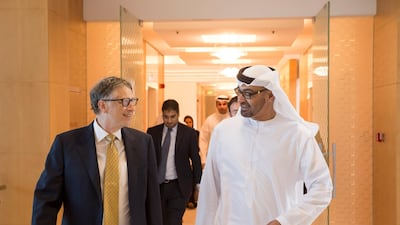A renewed drive to eliminate the world’s most dangerous diseases will be launched in Abu Dhabi this week.
Under the theme "accelerating the pace", Reaching the Last Mile Forum will look at the fight against polio and malaria, and what are known as neglected tropical diseases, of which little is known even though they endanger the health and lives of millions.
The global forum, which will bring together more than 250 health experts and organisations, will discuss the progress to end these diseases and seek new pledges of support.
Participants include the Global Institute for Disease Elimination (Glide) based in Abu Dhabi, announced in 2017 and to be launched this year.
The organisation will raise awareness of diseases such as river blindness, lymphatic filariasis and measles, but also develop strategies for fighting them.
Support for Reaching the Last Mile comes directly from Sheikh Mohamed bin Zayed, Crown Prince of Abu Dhabi and Deputy Supreme Commander of the UAE Armed Forces.
Two years ago, Sheikh Mohamed, the Bill and Melinda Gates Foundation and British government together pledged $100 million (Dh367.3m) to fight dangerous diseases.
The challenges faced in disease elimination are underlined by polio, which although now contained to only two countries, has seen a rise in cases this year.
While stable in Afghanistan, which reported 20 cases of wild polio so far this year and 21 in 2018, the picture is very different in Pakistan, where the number of those affected has risen tenfold to 80 from eight in 2018.
Health workers face challenges in reaching remote areas in both countries and cultural resistance to vaccinating children. The UAE support in Pakistan is delivered through the Emirates Polio Campaign.
The Global Polio Eradication Initiative (GPEI) will use the Abu Dhabi forum to seek new pledges of support, backed by the Crown Prince.
The GPEI will also use the forum to highlight the part played by women health workers and social mobilisers, who work on the ground to change attitudes and raise awareness of the importance of vaccinations.
There will be more focus on neglected tropical diseases as they currently affect 1.5 billion people worldwide, many of them in Africa. To bring home the impact on lives, Reaching the Last Mile has created two short films to be shown during the forum.
One film tells the story of Lelamo Turgemu from Sankura, Ethiopia, who suffers from lymphatic filariasis, which can cause elephantiasis, a disease caused by a parasitic worm that leads to severe swelling of the limbs.
Married with 10 children, Mr Turgemu was unable to support his family and forced to sell his land, trapping them in a cycle of poverty.
Last year, 13.5 million treatments for lymphatic filariasis and river blindness were delivered, and 76,000 health workers received training.
Another video features Kesach, a woman from Ethiopia afflicted with visible elephantiasis that led to her being shunned in her village. Proper medical treatment has alleviated the worst of her symptoms and enabled her to resume work.
There are some success stories, with cases of dracunculiasis, or Guinea worm disease, falling to 28 last year from 3.5 million in 1986.
The objective of Reaching the Last Mile is to eventually eliminate all these diseases, freeing the next generation from their perils.


